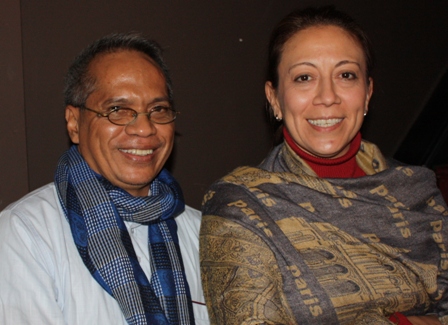Talking peace

Two peacebuilders sit down to discuss just how they bring opposing groups into the same room to talk peace and to lay the foundations for a future that rejects all use of violence. Wendy Cuellar is from Guatemala. João Boavida is from Timor-Leste.
“It’s easy in theory. In practice, however, it is a completely different story,” opens Wendy Cuellar, Programme Officer for the youth initiative that Interpeace is currently running across Central America. João Boavida, Executive Director of the Interpeace local partner, the Center of Studies of Peace and Development (CEPAD), agrees. Both have tailored the Interpeace “way of doing things” according to their area’s needs.
Wendy explains the context in which she works: “Central America has the highest violence rate in the world, and that violence is constant and ruthless. We’re working to ensure that all are involved in building peace: victims, perpetrators, the security sector, government representatives, NGOs and even those on the side lines. Together we come up with policy proposals to take to the top government decision-makers in order to adopt more effective policies that include prevention.”
“It is the collective element and getting people talking that is key,” Wendy admits. “That means opposing groups have to sit next to each other and talk. Imagine being a youth gang member and working constructively with a police officer. Imagine working for a charity on human rights and sitting down to work with a private security officer.
When we are alone with youth, or a private security officer, they are OK with the idea of coming together. However, when the moment comes to sit down face-to-face – it’s another story. They often don’t show up, and even when they do, it’s difficult to overcome the issues and to have everyone see common ground.”
Wendy explains how she and her team approach it: “This is when we have to be very clear about our role. We’re there to enable – not to take one side or the other. We’re neutral and there to facilitate. We promote dialogue and try to make them think in a more positive and future oriented way. We ask open questions: ‘Where do you see yourself ten years from now? What kind of future do you want to create?’ It is only when we get this type of conversation going that we can then start building a bridge of cooperation and achieve our goal.”
João, on the other hand, takes a different approach to his work in Timor-Leste. This country became independent in 2002 and today has a population of about 1 million that is spread across 15,007 km2, much of which is unreachable by road. These facts have not, however, stood in the way of João and his team. Their five years of peacebuilding has enabled them to develop a stream-lined and efficient mechanism to bring people together.
“We have District Liaison Officers in each of the 13 Districts. I get on the phone and discuss with them who needs to meet whom, and what the topic of discussion will be for an upcoming event. They come to Dili for a full briefing and share their ideas on how best to achieve a particular goal and to pick up the invitations and then head back to their communities. I arrive on the eve of a consultation with a team to make sure that all those who need to be in the room are present, ready to begin building bridges by initiating dialogue.”
To help facilitate a culture of peace, João has also championed the construction of four Peace Houses, each in different districts, and there are more on the way. “This makes things even simpler for us,” explains João. “Peace has a physical presence. We have rules as to how the houses can be used, but they are in fact open for all. Dialogue takes place in this ‘safe space,’ where the rules of the game are understood. But most importantly we have to keep the space itself safe, too. A caretaker lives in each one, to literally ‘take care of the peace.’”
João concludes: “The way we see it. Lasting peace must be grounded in getting people together to talk constructively and collectively agree. Doing this has to be tailored to the context.” Wendy nods in agreement: “It can be difficult, but getting people physically together and talking, is in itself, a clear victory for peace.”
Wendy and João were together in Brussels for a European Union Forum that talked about instruments for democracy and human rights.
